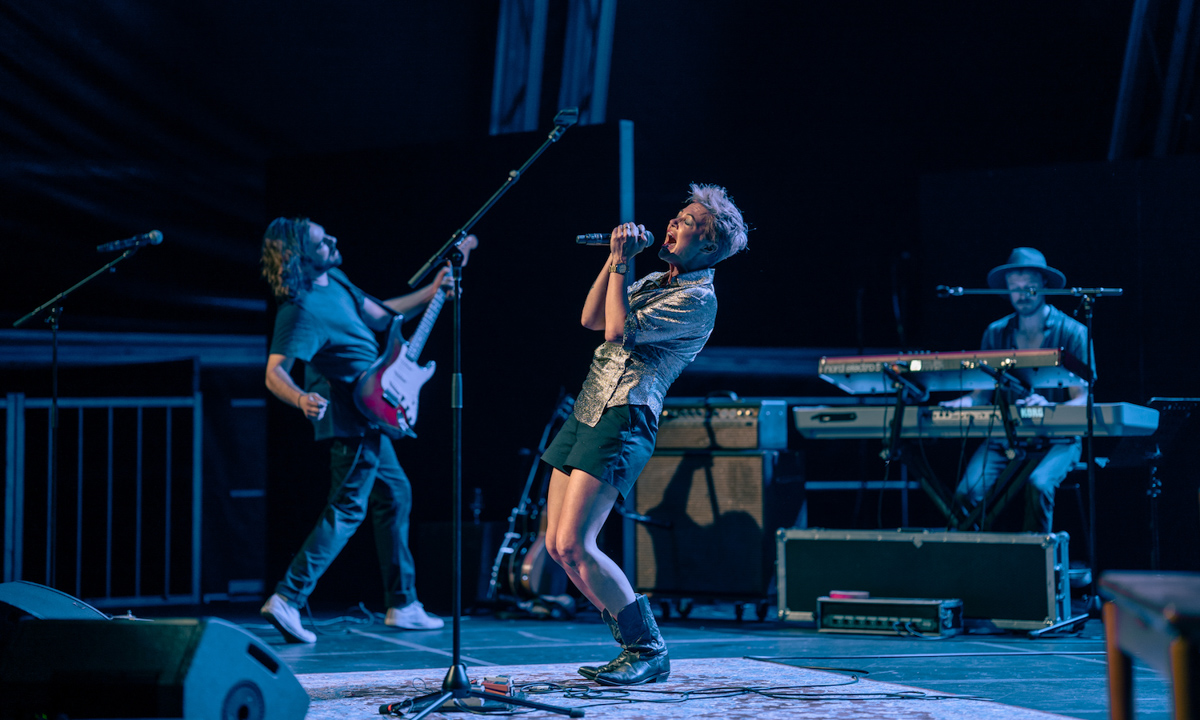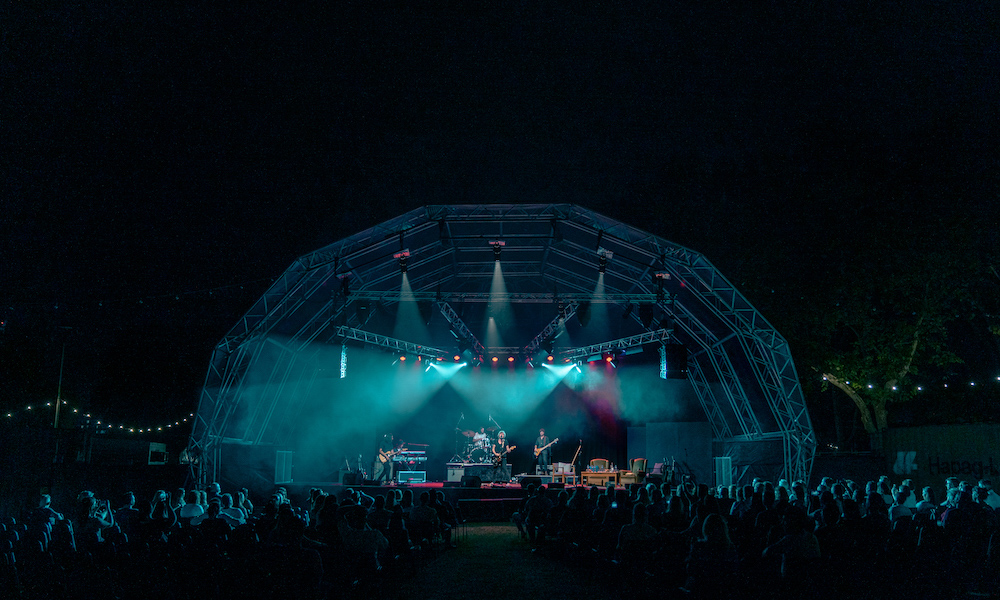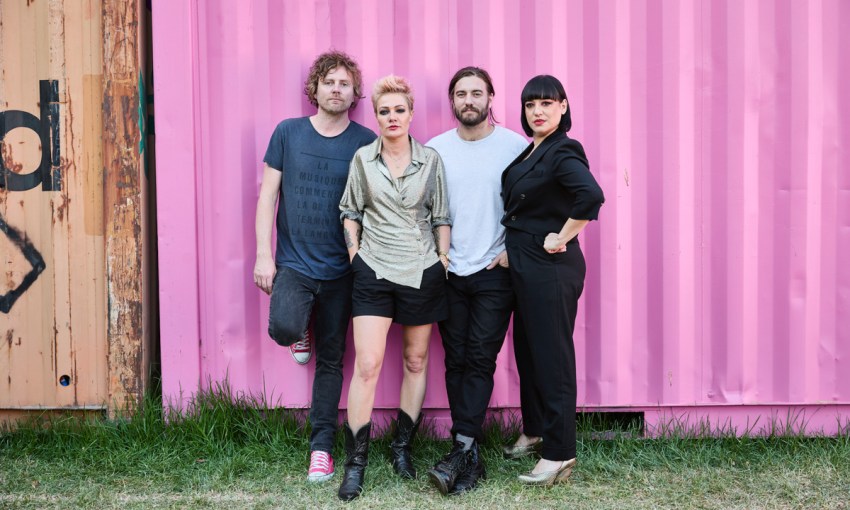In recreating the songs of the artists of the 27 Club, Wanderers frontman Dusty Lee Stephensen taps into the yearning desperation of musicians whose lives and creative careers were tragically cut short.
Rock and sorrow with ‘27 Club’
The illustrious, eternal members of the 27 club had an outsized influence on Adelaide musician Dusty Lee Stephensen.
Named for historical identities – mostly musicians – who died at age 27, the club is populated by artists who passed away in the prime of their creative life.
27 Club
18 February—6 March
The Moa
Gluttony
Murlawirrapurka Rymill Park, Adelaide 5000
Tickets and more info
Among the most well-known alumni are Nirvana’s Kurt Cobain, Janis Joplin, Jimi Hendrix, Amy Winehouse and The Doors’ Jim Morrison.
Dusty, who is lead singer of Wanderers, has been affected creatively in some way by all of the artists listed above.
He recalls the influence of seeing footage of Janis Joplin in a Woodstock documentary, and transcribing and learning to play ‘Purple Haze’ by Jimi Hendrix on guitar as a pre-teen. And as a contemporary working musician, he’s a deft hand at Amy Winehouse covers.
The musician also went through the requisite high-school-age Nirvana phase, where Dusty tried “to write these Kurt Cobain-esque songs, and try to pull the guitar tones”. Jim Morrison was also “a big inspiration as a frontman”.
All of these influences made Dusty and Wanderers a logical choice as the backing band for the returning Adelaide Fringe show, 27 Club.
Originally appearing in the Cabaret Festival, Wanderers joined 27 Club last year when it became part of the Adelaide Fringe lineup. Wanderers provide backing to Sarah McLeod (Superjesus), Kevin Mitchell (Jebediah, Bob Evans) and Carla Lippis as they, and Dusty, perform songs from the 27 club members’ collective repertoire.
Through coming onto the 27 Club production, Dusty rediscovered and reconnected with songs he thought he already knew completely.
“I’ve been playing ‘Purple Haze’ for a long time, but playing it with the band… it doesn’t feel like I’m just doing ‘Purple Haze’ again,” he says.
“We’re playing it, and it is kind of like I’m hearing it for the first time again. I’m re-falling in love with the song, and I’m remembering the power of it.”

Sarah McLeod of Superjesus at ’27 Club‘ last year. This image: Saige Prime
While the show remains faithful to the works of these popular artists, 27 Club is not just a karaoke night.
“We’re not sitting there trying to play these parts note for note or anything like that,” Dusty says.
“It’s important for me to know the attitude of the artists, and try to understand what they were going for. And I hate the idea of transcribing something note for note – a song that they never played the same twice, you know? Why would I?”
Collating artists based on the age they died can be read as a morbid and arbitrary act, but something about these musicians and their work has endured in popular culture, and in the minds of artists of subsequent generations.
In inhabiting these artists through their work, Dusty, who will travel to Austin with Wanderers for South by Southwest after the run of 27 Club shows, found a connecting thread – a sense of soulful yearning.
“I think we all witnessed the search for them trying to find themselves, trying to work out who they are,” Dusty says.
“They were all really lost souls, and they were searching, and maybe that desperation and the search is what led to such incredible art, and the output, and it being so relatable.
“When you hear that cry for help – or even if the song’s not about that, it’s in the delivery – there’s that thing. There’s a certain amount of desperation.
“It’s almost like they knew they were going to pass at 27 and they were trying to get it out before they did. That’s the same for all of them, the level of performance and what they would give to each song. It’s quite incredible.”
The show has also prompted Dusty to reflect on his own life as an artist.
“I know that a lot of them, they had long careers prior to their passing… but still, I know who I was at 27, and it was a half-finished version of myself,” Dusty says.
“I remember who I was and feeling a bit lost, trying to work out what sort of man I’m going to become and all of that sort of thing, so I know that’s where they were at, and I feel like I can relate to that, relate to them as artists at that point in time.
“It would’ve been a shame to me if that was cut short, because I wouldn’t have gotten to experience how I’ve grown and how I am now, and I feel settled and I feel like I know what I can offer and where I can steer things creatively and what I can do.”

‘27 Club‘ plays at Gluttony open-air venue The Moa. This picture: Saige Prime
Rifling through the back catalogues of Janis Joplin and Kurt Cobain also raises the question of the type of artist they might have become and the work they might have brought to the world if they were still alive today.
“Kurt Cobain was talking about wanting to move onto different types of music and experiment with other things, and I feel like he might have gone in a Daniel Johns-esque direction, trying to work with other producers or different artists and trying to do other things,” Dusty says.
“I think he was ready for that kind of thing. Jim Morrison – I mean who the hell knows? I don’t know if that guy was destined for anything other than exactly what happened.
“I guess it can make you feel a bit sad, but it’s also incredible that they got so much done… If you ever want to feel pretty insignificant with what you’ve done with your career, just look up what any of them had done by 22 years old. It’s pretty mind-blowing.”
Sadness and celebration is the duality of the 27 Club. It is a raucous requiem to brilliant lives interrupted.




